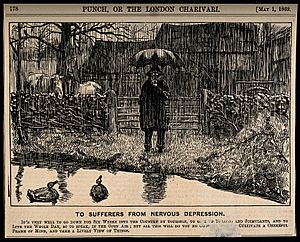Mood disorder facts for kids
A mood disorder is a type of mental illness where a person's main problem is their mood. Everyone has different moods, like feeling happy, sad, or excited. But for someone with a mood disorder, these feelings can become very strong or last a long time. They can make it hard to do everyday things.
The two main kinds of mood disorders are major depressive disorder (often called depression) and bipolar disorder. Sometimes, other things like certain medicines can also cause mood changes that are like a mood disorder. Many people with mood disorders might also have other challenges, such as anxiety disorders.
Contents
Understanding Mood Disorders
Our moods are how we feel inside. They can change often, like feeling happy one moment and a bit grumpy the next. This is normal. But sometimes, a person's mood can get stuck in one extreme. It might be very sad for a long time, or very, very happy and energetic. When these moods become so strong that they stop someone from living their life normally, it might be a mood disorder.
What are Moods?
Think of moods as the emotional weather inside you.
- Sometimes it's sunny and bright, and you feel happy and full of energy.
- Other times it's cloudy and rainy, and you feel sad or tired.
- These changes are a normal part of life.
However, for someone with a mood disorder, the "weather" can be extreme. It might be a never-ending storm, or a super-intense heatwave.
Types of Mood Disorders
There are different kinds of mood disorders. The most common ones are depression and bipolar disorder. Each one affects a person's mood in a unique way.
Depression
When someone has depression (also known as major depressive disorder), they feel very sad or empty for a long time. This is more than just feeling down for a day or two.
- They might lose interest in things they used to enjoy.
- They could feel very tired all the time, even after sleeping.
- Sleeping too much or too little can be a sign.
- They might have trouble concentrating or making decisions.
- Sometimes, they might feel worthless or guilty.
These feelings can last for weeks, months, or even longer. It can make it hard to go to school, see friends, or do hobbies.
Bipolar Disorder
Bipolar disorder involves big shifts in mood. People with bipolar disorder experience both very high, energetic moods (called mania or hypomania) and very low, sad moods (depression).
- During a manic phase, a person might feel extremely happy, full of energy, and not need much sleep. They might talk very fast, have lots of ideas, or take big risks.
- During a depressive phase, they feel very sad, tired, and lose interest in everything, just like someone with depression.
These mood swings can make life very confusing and challenging.
Why Do Mood Disorders Happen?
Mood disorders are not anyone's fault. They are complex conditions, and scientists are still learning exactly why they happen.
- Brain Chemistry: Our brains use special chemicals called neurotransmitters to send messages. If these chemicals are out of balance, it can affect mood.
- Genetics: Sometimes, mood disorders can run in families. This means if a parent or close relative has one, you might have a higher chance of developing one too.
- Life Events: Stressful or difficult life events, like losing a loved one, big changes, or ongoing challenges, can sometimes trigger a mood disorder in people who are already at risk.
It's usually a mix of these things, not just one cause.
Getting Help
If you or someone you know is struggling with their mood, it's really important to get help. Mood disorders are real medical conditions, just like a broken arm or a cold. They can be treated, and people can feel much better.
How Doctors Help
Doctors and mental health professionals can help people with mood disorders.
- Talking Therapy: This involves talking to a trained therapist about your feelings and thoughts. It can help you understand your emotions and learn ways to cope.
- Medication: Sometimes, doctors might prescribe medicine to help balance brain chemicals. These medicines are safe and can make a big difference for many people.
- Support: Getting support from family, friends, and support groups can also be very helpful.
How You Can Help Yourself
If you are feeling down or your moods are hard to manage, here are some things you can do:
- Talk to someone you trust: A parent, teacher, school counselor, or another adult can help you find support.
- Stay active: Exercise can help improve your mood.
- Eat healthy and sleep well: Taking care of your body helps your mind too.
- Do things you enjoy: Even if it's hard, try to keep up with hobbies or activities that make you happy.
- Limit screen time: Too much time online can sometimes make feelings worse.
- Be patient with yourself: Getting better takes time.
Supporting Others
If a friend or family member has a mood disorder, you can help by:
- Listening: Let them know you are there for them without judgment.
- Encouraging them to get help: Suggest they talk to an adult or professional.
- Being understanding: Remember it's not their fault, and they are trying their best.
- Including them: Keep inviting them to activities, even if they often say no.
- Learning more: Understanding their condition can help you be a better friend.
Remember, mood disorders are treatable, and with the right help, people can lead happy and fulfilling lives.
See also
 In Spanish: Trastornos del estado de ánimo para niños
In Spanish: Trastornos del estado de ánimo para niños
 | Roy Wilkins |
 | John Lewis |
 | Linda Carol Brown |


